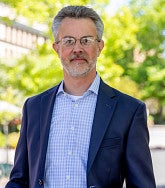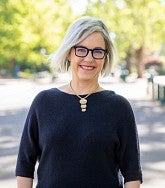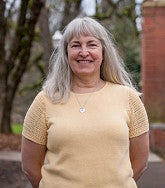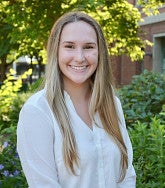In summer 2023, students have an opportunity to take an international approach to their education by participating in the “Clark Honors College in Berlin” study abroad program. Applications for this unique learning experience are now open.
In Berlin, students will get to know the German city, both as it was 50 years ago and as it is today. Led by CHC Professor Ian F. McNeely, students will visit world-renowned museums and other iconic locations that add to the character of one of the most notable cities in Europe. They will earn eight colloquia credits during their stay, immersing themselves in Berlin’s rich history and its unique way of life.
We asked members of the CHC community – both faculty and students – what the benefits are from studying abroad.

Ian McNeely, CHC Professor of History
McNeely will lead the “Clark Honors College in Berlin” study abroad program. He’s eager to help students get to know the city, while also teaching them about its history, architecture, and more.
What are you most looking forward to for the summer trip?
Berlin is an old city. It’s a medieval city. But, in a different way, it’s got that European city vibe and quality of life thing going on. I haven’t been to Berlin in about 10 years. So, I’m looking to see what’s changed even in that time.
Why should students sign up?
It’s just so valuable to go to another country. You come to appreciate different ways of doing things. Going to another country is a way of experiencing that very humbling recognition that we don’t know everything. I want to encourage students to take the plunge and realize that this is about the safest way you can deliberately make yourself feel exposed to a different way of life.
What will the courses look like?
Berlin, the Urban Experience.
We start with the period when the Berlin Wall stood between 1961 and 1989. It was, depending on your point of view, a socialist paradise or a total communist, totalitarian nightmare. We go visit the Museum of the Stasi, which was the secret police that spied on citizens. We look at West Berlin during the same time period. It was an enclave in the middle of East Germany and attracted a lot of artists and hippies, so it was a kind of multicultural, counter-cultural center. The Berlin Wall falls in 1989, and Berlin becomes the capital of the unified country. They go on this building spree, they modernize it, it’s completely changed typography. And we kind of do a combination of Berlin right now and a flashback to the post-World War II reconstruction, when it was left in rubble and look at how you rebuild a city.
The Quality of Life in the European Union
This course responds very much to my own interests, and to my own concerns and criticisms about the United States. So, there’s a lot on the European welfare state, universal health care, education, social security, and public transportation. It’s built around the themes of family and community, work and leisure, health and education, and peace and security. So it ends up with a very present focus. On the one hand, Western Europe has some of the highest quality of life in the world. But it’s also a part of the world that's experienced, and continues to experience, horrible wars, human rights violations, and whatever problems they may have in heating their homes during the winter.
What do you want students interested in the trip to know?
I just want any student who is at all curious to feel comfortable contacting me. I want people who have an interest or an inclination to study abroad, but also those who are maybe intimidated by it, as I was, when I first got on that plane to Berlin.
❦

Kate Mondloch, CHC Professor of History of Art and Architecture
Mondloch has been with the Clark Honors College for two years and has been leading study abroad trips since 1996.
Why should students check out Clark Honors College in Berlin?
The reason I would pick that program is if you look at your four-year plan, you realize that you need these five colloquia. And if you haven’t done five and you can do two in the summer, it’s just a tidy way to get those done. But, also, Berlin is amazing. It is a really world-class, extraordinary city, and easy to get around even if you don’t speak German.
What would you say to students on the fence about applying?
I would say it’s so easy to get these credits this way. There’s nothing else that will guarantee you two colloquia without jumping through a lot of hoops.
What have students on study abroad trips you’ve led said about the experience?
They’re just so excited to see what other possibilities there are for life that you just don’t think about. You might read about them. You might watch a movie about traveling. But when you’re actually living them and seeing an entirely different culture up close, eating the food, and immersing yourself briefly in another place? Words almost fail me. I haven’t met anyone who’s regretted it.
❦

Lisa Wolverton, CHC Professor of History
Wolverton, who focuses on medieval Europe, will be joining the trip. She will share her knowledge about medieval Germany and help provide support to students.
What are you most looking forward to?
I think it’s always really fun to see the places that you study in real life. We’re going to travel to Erfurt, which is a late-medieval city. My job is to orient students toward that. It’ll be fun to just think about how cities were laid out 600 years ago. What’s left and what’s different, what the structures are for and how they might have worked culturally.
Why do you think students should apply?
It’s going to be a lot of fun, and it’s a great opportunity to learn and get credits in the same way you would if you were here in Oregon, but experience a little bit of another culture and another place. Shake things up a little and wake up to new opportunities to bond with the other students and professors.
❦

Erin McCloat, CHC Senior
McCloat, a business major, has spent two summers studying abroad during her time at UO. In 2021, she travelled to London on the CHC program, “The Genius of Study Abroad.”
What was the highlight of studying abroad with the CHC?
Our professor was so encouraging and so willing to listen. She would really try to help us do things that would help us in the future. I loved that relationship with a faculty member. It’s something I hadn’t really had before that.
What would you say to students who aren’t sure about studying abroad yet?
I would just say do it. I regret absolutely nothing. Being able to go abroad is one of the biggest highlights of my college career, and I don’t think people really realize how it valuable it can be to be learning in such a different environment.
What’s the biggest academic difference about studying abroad?
Professors will explicitly say you’re not here to only focus on your academics. They were like, go out, meet people, and get a feel for the culture. Being able to learn in those different communities was really helpful to see how different parts of the world prioritize different aspects of life.
—By Elizabeth Yost, Clark Honors College Communications
